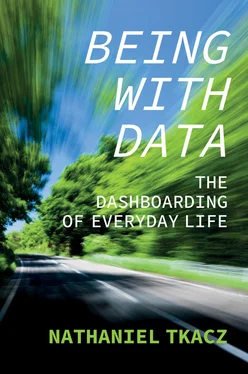216 236
217 237
218 238
For Lena
Being with Data
The Dashboarding of Everyday Life
Nathaniel Tkacz
polity
Copyright © Nathaniel Tkacz 2022
The right of Nathaniel Tkacz to be identified as Author of this Work has been asserted in accordance with the UK Copyright, Designs and Patents Act 1988.
First published in 2022 by Polity Press
Polity Press
65 Bridge Street
Cambridge CB2 1UR, UK
Polity Press
101 Station Landing
Suite 300
Medford, MA 02155, USA
All rights reserved. Except for the quotation of short passages for the purpose of criticism and review, no part of this publication may be reproduced, stored in a retrieval system or transmitted, in any form or by any means, electronic, mechanical, photocopying, recording or otherwise, without the prior permission of the publisher.
ISBN-13: 978-1-5095-4533-9
A catalogue record for this book is available from the British Library.
Library of Congress Control Number: 2021949634
The publisher has used its best endeavours to ensure that the URLs for external websites referred to in this book are correct and active at the time of going to press. However, the publisher has no responsibility for the websites and can make no guarantee that a site will remain live or that the content is or will remain appropriate.
Every effort has been made to trace all copyright holders, but if any have been overlooked the publisher will be pleased to include any necessary credits in any subsequent reprint or edition.
For further information on Polity, visit our website:
politybooks.com
This book began as a conversation with my former colleague Will Davies. It became something more through a project we schemed up together, ‘Interrogating the Dashboard: Data, Indicators and Decision-Making’, which received financial support from the Economic Social Research Council (ESRC) in the UK (ES/M00077X/1). I would like to thank Will, Ana Gross, Jamie Bartlett and Carl Miller from DEMOS and the Open Work design team (Kai, Lizzie and Dan) for being part of this project. Through Jamie and Carl, I was able to develop a relationship with people from the software company Qlik and I would like to thank everyone there for offering their time and thoughts. I would especially like to thank David Bolton, who arranged access to key personnel and clients.
A second set of conversations began when João Porto de Albuquerque became my colleague in the Centre for Interdisciplinary Methodologies (CIM) at the University of Warwick. I have benefited greatly from his kindness and friendship and from his opening new worlds for me. The parts of the book set in Brazil would not be possible without him. Funding from the Belmont Forum, ESRC (ES/S006982/1) and Fundação de Amparo à Pesquisa do Estado de São Paulo (FAPESP) for the project ‘Waterproofing Data: Engaging Stakeholders in Sustainable Flood Risk Governance for Urban Resilience’ enabled us to visit Brazil regularly. Flávio Horita provided early research assistance in the situation room in Cemaden. Following Flávio, Mário Henrique da Mata Martins joined ‘Waterproofing Data’ as a postdoc and became my main collaborator. While the intellectual framing of chapter 3 on ‘Formatting Data’ is my own, it draws on empirical work we did together and often with Mário taking the lead. My gratitude also goes to Maria Alexandra Cunha, based at the Getulio Vargas Foundation in São Paulo, and Vangelis Pitidis at Warwick, for offering a lot of general support with ‘Waterproofing Data’. During my visits to the situation room in Cemaden I made several new friends, including Liana Anderson, Rachel Trajber, Victor Marchezini, Conrado Rudorff and Giovanni Dolif Neto. Thanks for the lunches and dinners, the desk space and making me feel less of an outsider! Research in the situation room would not have been possible without the support of the many specialists who work in the room or support its operation.
For inviting me to share work in progress, I would like to thank Louise Amoore, Rob Kitchin, Richard Rogers, Jonathan Gray, Helen Kennedy, Robert Cowley, Scott McQuire and Theo Röhle. I am also grateful to the Digital Humanities Department at King’s College London and the Getulio Vargas Foundation in São Paulo for hosting me as Visiting Senior Research Fellow and Visiting Professor, respectively. Thanks in addition to the staff at the Coventry Transport Museum.
I am fortunate to have excellent and inspiring colleagues in CIM at the University of Warwick, but special thanks go to Nerea Calvillo and Maria Puig de la Bellacasa for being my writing companions. Celia Lury read the first draft and provided very insightful feedback. Since we first met as PhD students in Melbourne, Michael Dieter has been a constant friend and intellectual inspiration.
I would like to thank the anonymous reviewers at Polity for their feedback. The editorial team of Mary Savigar and Stephanie Homer were a pleasure to work with, and thanks to Mary for reading the manuscript with an editor’s eye.
Since 2012, I have made a home in the English West Midlands, 10,000 miles from where I was raised on the outskirts of Melbourne, Australia. This life would not be possible without the love and ongoing support of my partner, Mia. Thanks also to Ernie, Lena and Dominic for reminding me that working in front of a computer all day can be very boring.
Introduction
Being with Data
I hold my arm up to the sky and let my wrist flop so an apex forms at the joint. The face of the watch attached to this wrist is now pointing to the heavens, as elevated as can be practically achieved. I keep the arm dead still. It has just passed 9 a.m. on a cloudy summer’s morning in the English Midlands and the Coventry 5-km parkrun is about to begin. Similar runs like this – parkruns – are taking place all over the UK and indeed many other countries. I am in a crowd of scantily clothed bodies; a small sea of limbs and brightly coloured apparel; hats, sunglasses, headphones and other elements of a runner’s uniform. Around me are a mix of seasoned runners and younger upstarts. Many are fidgeting with different devices. Pushing buttons, swiping, tapping or adjusting headphones while bouncing on toes or stretching out limbs in anticipation of the start. I have no idea if holding my arm up to the skies actually helps, but I’ve seen others do it and the race is about to start. I’m trying to activate the GPS on my smart watch, which has been playing up. It is not fond of cloudy days. Without the GPS activated, this watch that I’ve come to rely on for my Saturday morning run is useless.
A man goes through the weekly ceremonial congratulations and recognitions that are part of parkrun convention: such and such has made it to 100 runs, such and such regular runners just got married, ‘any first timers?’, ‘anyone from out of town?’ (a few raised hands; applause), ‘please consider volunteering …’ (silence). While this is going on there’s a slight surge at the front and a jostling for position. Latecomers are ducking under the guide ropes and slotting into any remaining spaces. It remains civil, but a subtle defending of one’s territory is needed to ensure you don’t get nudged backwards. I’m still holding my arm in the air, feeling sheepish and a little desperate, but then I feel a buzz on my wrist. Finally! I see the watch interface flash green. The GPS is active. The man with the loudspeaker approaches the starting line. Along with almost all the runners around me, I hold my finger on the start button of my watch. ‘Ready … Go.’ I am close to the front and cross the start line a few seconds after his call, pressing the start button as I do.
Читать дальше


![Элизабет Ленхард - Свидание со смертью[Date With Death]](/books/79651/elizabet-lenhard-svidanie-so-smertyu-date-with-dea-thumb.webp)









